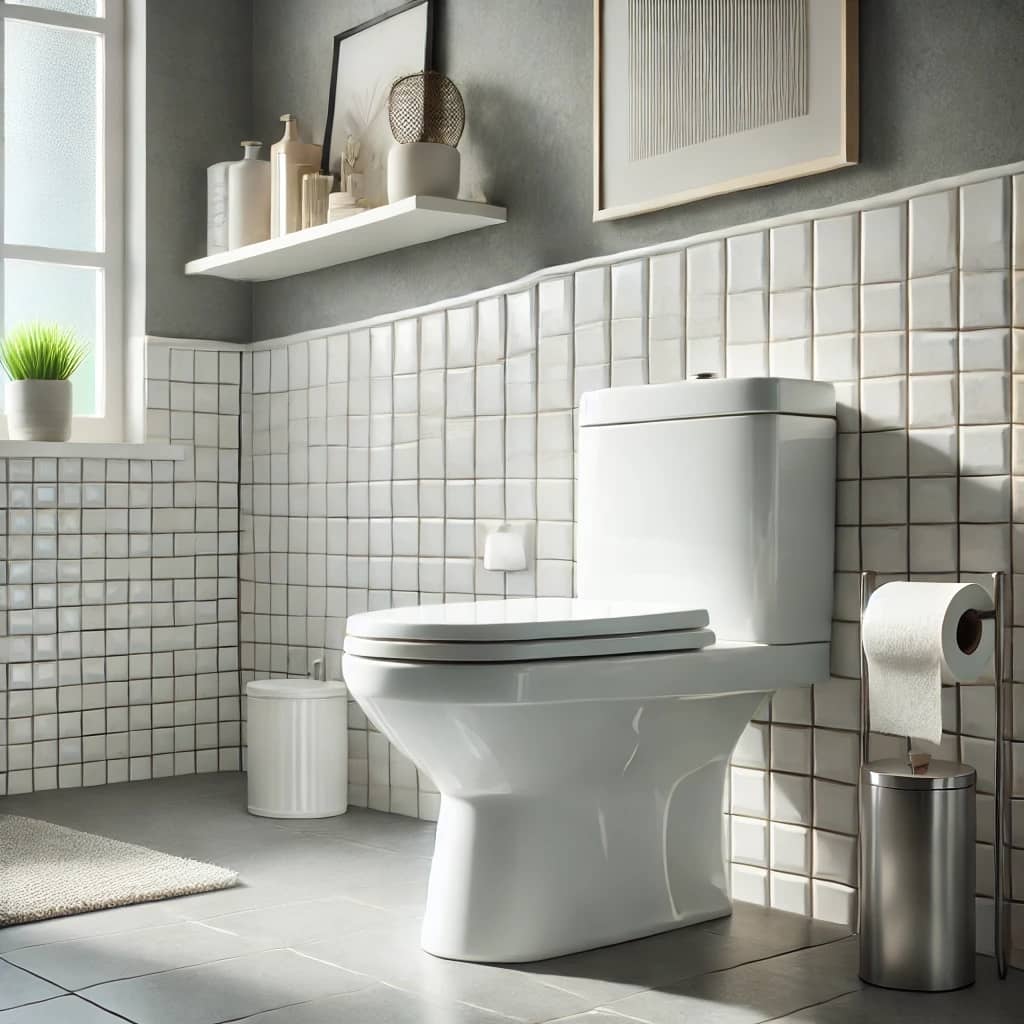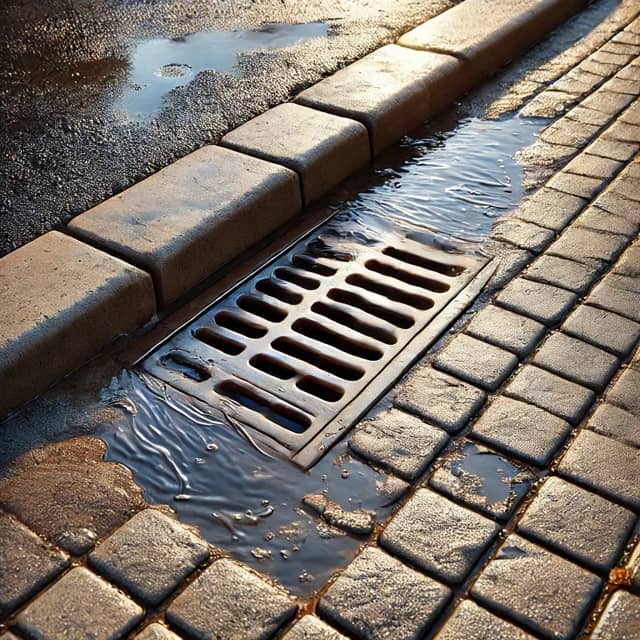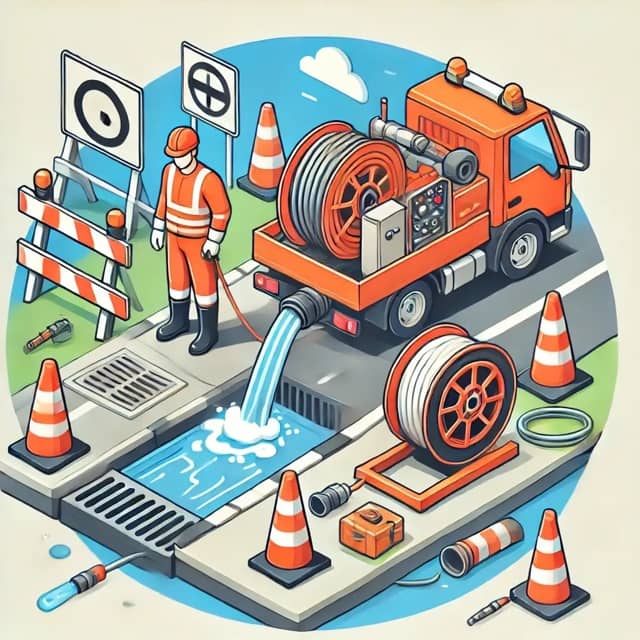What starts as a small nuisance can become a major headache with blocked drains. This is especially true when the weather turns bad.
To learn more take a look at our main drain unblocking page.
Frequent Causes of Blocked Drains in Aireborough
Drainage systems in Aireborough, experience blockages caused by various factors, commonly due to regular activities. The following are the usual suspects:
Fat and Grease Accumulation
Kitchen drain blockages are often caused by fat, oil, and grease. Once cooled, they solidify in the pipes, which can build up and slow down water drainage.
Over time, this can lead to complete blockages, causing water to back up. Takeaways in Aireborough frequently encounter this issue.
Hair Buildup and Soap Residue
In bathrooms, hair and soap residue can combine to form tough clogs in shower and sink drains.
As it accumulates, it prevents proper drainage, causing water to drain slowly or pool.
Objects That Shouldn’t Be Flushed
Items like wipes, sanitary products, or even small toys can easily become lodged in toilets or pipes.
Unlike toilet paper, many of these objects don’t break down in water, leading to significant blockages.
Tree Roots and External Debris
In Aireborough, tree roots and outdoor debris can cause serious drainage issues. Such issues can cause major blockages, particularly during heavy rain.

When to Call a Drain Unblocking Service
These signs indicate that you should reach out to a drain unblocking service in Aireborough:
Gradual Water Drainage
If water is slow to drain from your sinks or showers, a blockage may be forming.
Unusual Drain Smells
If your drains emit foul smells, there may be decaying debris blocking the pipes.
Bubbling Sounds
If you hear gurgling or bubbling sounds when water drains, this could be air trapped by a blockage, trying to escape through the system.
Standing Water or Overflowing Drains
Standing water in sinks, baths, or external areas often signals a significant blockage.
Professional Drain Unblocking Services in Aireborough
When faced with a blocked drain, professional help is often the best and quickest way to resolve the issue.
After checking with Aireborough council and Leeds City Council, it might be time to call a professional.
Water Jetting at High Pressure
High-pressure water jetting effectively clears blockages from drains.
The process involves shooting water through pipes to clear away grease, roots, or debris.
This method is both thorough and environmentally friendly, as it doesn’t rely on chemicals.
Mechanical Snaking Techniques
For smaller or more localised blockages, a drain snake or auger may be used.
This is a flexible, mechanical tool that can reach into pipes and physically break up clogs caused by hair, soap, or foreign objects.
Drain Surveys Using CCTV
CCTV drain inspections are used when blockages are hard to detect.
This involves sending a small camera down the drain to locate the blockage and assess the condition of your pipes.
Repairing Drainage Systems
In some cases, a blockage may be caused by a more serious issue, such as a broken or collapsed pipe. These services restore the system to good working condition.

Aireborough: A Thriving Community with Drainage Maintenance Needs
Aireborough, located in West Yorkshire, is a historically significant area that includes the towns of Guiseley, Yeadon, and Rawdon.
Once an urban district (1937–1974), Aireborough is now part of the Leeds metropolitan area.
Known for its rich history and vibrant community, Aireborough also made headlines as “the most average place in England and Wales” after the 2001 census, due to its representative demographics.
However, like many urban areas, Aireborough faces modern infrastructure challenges, including the need for effective drainage systems.
Why Drainage Maintenance Matters in Aireborough
Maintaining functional drainage in Aireborough is essential to prevent common issues such as waterlogging, blocked drains, and property damage.
Given the area’s mix of older properties and modern developments, drainage systems are often under pressure from:
- Flushing unsuitable items like wet wipes, grease, or sanitary products.
- Natural blockages caused by debris, sediment, or tree roots.
- Heavy rainfall overwhelming older drainage systems.
Blocked drains can lead to foul odours, slow-draining water, and potential flooding, which makes timely maintenance crucial.
Local Drainage Solutions
Residents in Aireborough can take advantage of local resources to manage drainage effectively:
- Yorkshire Water (yorkshirewater.com) oversees public sewers in the area. Residents can report blockages that extend beyond property boundaries.
- Leeds City Council (leeds.gov.uk) provides support for communal drainage systems and offers guidance for maintaining local infrastructure.
Tips to Prevent Drainage Issues
- Clear outdoor drains regularly: Remove leaves and debris to keep water flowing.
- Dispose of waste responsibly: Avoid pouring fats or oils down sinks and use drain strainers to catch food particles.
- Monitor for early signs of blockage: Slow-draining water and unpleasant smells can signal an issue.
Keeping Aireborough Drains Flowing
By proactively maintaining their drainage systems, Aireborough residents can minimise disruptions and protect their homes and businesses.
For more information or to address drainage concerns, consult resources like Yorkshire Water or trusted local professionals.

Who Is Responsible for Unblocking Your Drain in Aireborough: Tenant, Landlord, or Local Council?
In Aireborough, which includes the towns of Guiseley, Yeadon, and Rawdon, responsibility for unblocking drains depends on the cause and location of the blockage.
Knowing whether the tenant, landlord, or local council is responsible can help resolve the issue efficiently and avoid further complications.
Tenant Responsibility
Tenants in Aireborough are usually responsible for clearing blockages caused by improper use or daily activities. Examples of tenant responsibilities include:
- Flushing unsuitable items such as wet wipes, nappies, or sanitary products.
- Pouring fats, oils, or food waste down the sink, which can solidify and clog pipes.
- Allowing hair or soap residue to accumulate in bathroom drains.
To minimise the risk of blockages, tenants should take preventative measures like using sink strainers and disposing of waste appropriately.
Addressing minor clogs, such as slow-draining sinks, is typically part of a tenant’s responsibilities.
Landlord Responsibility
Landlords in Aireborough are accountable for the structural maintenance of drainage systems. This includes:
- Repairing collapsed pipes or damage caused by tree roots.
- Addressing blockages arising from long-term wear and tear.
- Ensuring drainage systems are in good working condition at the start of a tenancy.
If the issue results from faulty installations or ageing infrastructure, the landlord is responsible for arranging and covering repair costs.
Local Council Responsibility
Drainage issues beyond private property boundaries, such as those affecting public drains or sewers, often fall under the jurisdiction of Leeds City Council or Yorkshire Water. Responsibilities include:
- Maintaining public sewers and drainage systems in shared or public areas, like roads and communal spaces.
- Clearing blockages in main sewers serving multiple properties.
Residents experiencing a public sewer blockage in Aireborough should report it to Yorkshire Water (yorkshirewater.com) or Leeds City Council, depending on the nature and location of the problem.
Steps to Resolve Drainage Issues in Aireborough
- Review your tenancy agreement: This document clarifies responsibilities for tenants and landlords.
- Identify the blockage location: If it is beyond your property boundary, contact Yorkshire Water or Leeds City Council.
- Act quickly: Prompt action can prevent more severe issues, such as flooding or property damage.
Proper drainage maintenance in Aireborough ensures a safe and comfortable living environment for residents.
By understanding their responsibilities and taking proactive measures, tenants, landlords, and local authorities can work together to maintain efficient drainage systems in this vibrant West Yorkshire community.

